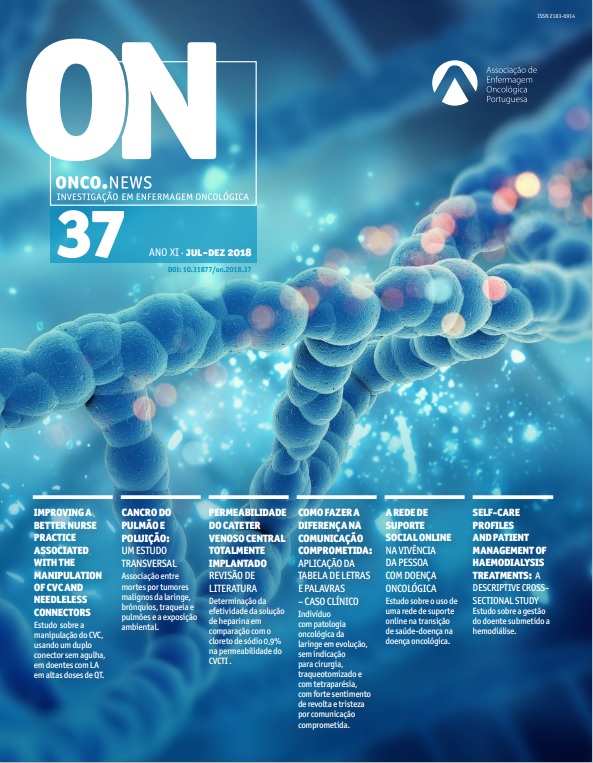Self-care profiles and patient management of haemodialysis treatments: a descriptive cross-sectional study
Keywords:
Patient Compliance, Haemodialysis, Nursing, Self-careAbstract
This study aimed to explore the self-care theory proposed by Orem and to perform a detailed categorization of the related profiles. The performed research enabled the identification of four profiles and goals were set to establish a correlation between self-care profiles and self-management of the therapeutic regimen; to establish a relationship between demographic characteristics and self-care profiles and to establish a correlation between self-care profiles and obstacles to an effective management of the therapeutic regimen.
The design was cross-sectional, descriptive and correlational. Interviews were conducted with 122 patients undergoing haemodialysis in a healthcare unit. Clinical outcomes were extracted from medical records.
The results show that patients with the highest scores in the responsible self-care profile are those with improved knowledge (liquid - R=.250; p=.006; medication – R=.246; p=.006); who take better care of their vascular access (R=.186; p=.042); who manage their diet better (R=.247; p=.006); and who face fewer obstacles than the others (R=-.207; p=.022).
The research findings show that the implementation of successful nursing treatment plans depends on the knowledge and understanding of patients perceptions regarding self-care and that this indicator will be of the utmost importance when helping patients in the transition to a new health condition and to experience a better quality of life.
Downloads
References
Santos I, Rocha RPF, Berardinelli LMM. Necessidades de orientação de enfermagem para o autocuidado de pacientes em terapia de hemodiálise. Rev Bras Enferm 2011; 64: 335-42.
Rahimi A, Ahmadi F, Gholyaf M. The effects of Continuous Care Model on depression, anxiety, and stress in patients on haemodialysis. Nephrol Nurs J 2008; 35: 39-43.
Denhaerynck K, Manhaeve D, Dobbels F, Garzoni D, De Geest S. Prevalence and consequences of nonadherence to haemodialysis regimens. Am J Crit Care 2007; 16: 222-35.
Chenitz KB, Fernando M, Shea JA. In-center haemodialysis attendance: Patient perceptions of risks, barriers, and recommendations. Hemodial Int 2014; 18: 264-373.
Kim Y, Evangelista LS, Phillips LR, Pavlish C, Kopple JD. The End-Stage Renal Disease Adherence Questionnaire (ESRD-AQ): testing the psychometric properties in patients receiving in-center haemodialysis. Nephrol Nurs J 2010; 37: 377-93.
Pinheiro J. Autonomia e aderência na pessoa com doença renal crónica. Rev Bioét 2011; 19: 219-29.
Kim Y. Evangelista LS. Relationship between illness perceptions, treatmentadherence, and clinical outcomes in patients on maintenance haemodialysis. Nephrol Nurs J 2010; 37: 271-81.
Department of Health. Self-care – A real choice: self-care support – A practical option. Supporting self-car. London: DL; 2005. Available at:https://www.nationalarchives.gov.uk/webarchive/ Accessed at: 2016-11-04.
Orem, DE. Modelo de Orem: conceptos de enfermería en la práctica. Barcelona: Masson; 1991.
Söderhamn O. Self-care activity as a structure: a phenomenological approach. Scand J Occup Ther 2000; 7: 183-89.
Söderhamn O. Health and the internal structure of the selfcare ability scale for the elderly (SASE). Scand J Occup Ther 2001; 8: 67-71.
Backman K and Hentinen M. Factors associated with the self-care of home-dwelling elderly. Scand J Caring Sci 2001; 15: 195-202.
Räsänen P, Backman K, Kyngäs H. Development of an instrument to test the middle-range theory for the self-care of home-dwelling elderly. Scand J Caring Sci 2007; 21: 397-405.
Zeleznik D. Self-care of the home-dwelling elderly people living in Slovenia. Oulu: Oulu University Press; 2007.
Martins MRI and Cesarino CB. Qualidade de vida de pessoas com doença renal crónica em tratamento hemodialítico. Rev Lat Am Enfermagem 2005; 13: 670-76.
George FHM. Norma da Direção Geral da Saúde nº 017/2011. Lisbon: Direção Geral da Saúde; 2011.
Simmons L. Dorothea Orem’s self-care theory as related to nursing practice in haemodialysis. Nephrol Nurs J 2009; 36: 419-21.
Yamana E. The relationship of clinical laboratory parameters and patient attributes to the quality of life of patients on haemodialysis. Jpn J Nurs Sci 2009; 6: 9-20.
Backman K and Hentinen M. Model for the self-care of home-dwelling elderly. J Adv Nurs 1999; 30: 564-72.
Mota, LAN. O perfil de autocuidado dos clientes: exploração da sua influência no sucesso após transplante hepático. Rev Referência 2012; Sup.: 226.
Moorhead S, Johnson M, Maas ML, Swanson E. NOC: Classificação dos Resultados de Enfermagem. 4th ed. São Paulo: Elsevier; 2010.
Tomlinson, LM. Patient and practitioner literacy and women’s health: A global view from the closing decade 1990-2000. Ethn Dis 2003; 13: 248-58.
DeWalt DA, Berkman ND, Sheridan S, Lohr KN, Pignone MP. Literacy and health outcomes: A systematic review of the literature. J Gen Intern Med 2004; 19: 1228-39.
Oliveira CR, Rosa MS, Pinto AM, Veríssimo MT. Estudo do perfil de envelhecimento da população portuguesa. Lisbon: Ministério da Saúde; 2010. Available at: http://rihuc.huc.min-saude.pt/bitstream/10400.4/992/1/ACS%20EPEPP%20LIVRO.pdf Accessed at: 2016-11-04.
Kugler C, Maeding I, Russell CL. Non-adherence in patients on chronic haemodialysis: an international comparison study. J Nehprol 2011; 24: 355-75.
Araújo S, Lemes HP, Cunha DA, Queiroz VS, Nascimento DD, Ferreira Filho SR. Cardiac morphology and function in patients with and without residual diuresis on haemodialysis. Braz J Nephrol 2011; 33: 74-81.
Welch JL, Perkins SM, Johnson CS, Kraus MA. Patterns of interdialytic weight gain during the first year of haemodialysis. Nephrol Nurs J 2006; 33: 493-9.
Clark-Cutaia, RD, Ren D, Hoffman LA, Burke LE, Sevick MA. Adherence to haemodialysis dietary sodium recommendations: influence of patient characteristics, self-efficacy, and perceived barriers. J Ren Nutr 2014; 24: 92-9.
Downloads
Published
How to Cite
Issue
Section
License
Copyright (c) 2018 Ana Amorim Evaristo , Paulo Marques

This work is licensed under a Creative Commons Attribution-NonCommercial-ShareAlike 4.0 International License.




